Delusions about a “New Kashmir”
August 15, 2019 at 1:18 pm | Posted in Uncategorized | Leave a commentTags: colonialism, democracy, India, Kashmir, Pakistan, terrorism
Last Thursday, 8 August 2019, Indian Prime Minister Narendra Modi spoke to the nation justifying his government’s decision to end the ‘special status’ accorded to India’s only Muslim majority state, Jammu and Kashmir, and indeed to dismantle it as a state and make it into two Bantustans—Jammu & Kashmir with a legislature shorn of several important powers, especially with regard to law and order and land which will be controlled by the federal government; and Ladakh which would be ruled directly from New Delhi with no pretence of democratic accountability to its residents. In particular, the new regulations struck down a provision in the Indian Constitution—Article 35A—which restricted the purchase of land in Jammu & Kashmir to those whom its legislature classified as permanent residents. This provision, Prime Minister Modi said would lead to a new Kashmir, a naya Kashmir, which would become prosperous due to the possibilities open to investment: a reintegration with economic benefits
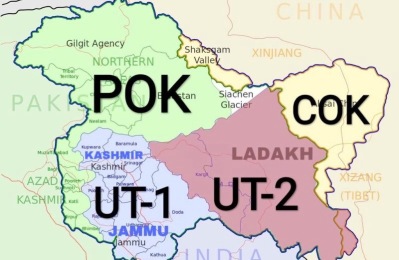
These measures were widely popular in much of the rest of India—with people bursting crackers, a routine practice of celebration, vowing to buy land there, even leading to the creation of a whole sub-genre of songs: and, with some in Haryana and other states, known for female foeticide and infanticide, fantasying bringing “white” Kashmiri brides!
In an unmistakeable parallel with the “white man’s burden,” Nirupama Rao, a former Foreign Secretary, wrote that in the Times of India that Kashmir was economically 200 years behind the rest of India—a claim that is patently untrue!

On a variety of socio-economic indicators, Kashmir fares better than the average for India: Jammu & Kashmir’s infant mortality rate (children under the age of one) per 1000 is 23; for India as a whole it is 33; Life expectancy at birth is 73.5 in Jammu and Kashmir, 68.7 is the India average; the poverty rate is 10.4 in J&K but 21.9 is the India average; the sex ratio at birth is 917 in J&K and only 896 in all of India, to take just a few indicators. Yet, Rao claimed:
Most importantly, the views of the Kashmiris were never sought. But let us examine the proposition whether the new measures would in fact bring about prosperity. The claim is based on the proposition that the removal on restrictions on the purchase of land would lead to a spurt in investment in tourism and even movie-maklng. Contrary to popular belief, this was a law introduced in Kashmir by its Hindu maharaja in the 1927 to quell fears among Hindus in Kashmir that outsiders—Punjabis, Europeans, others—would buy land in the idyllic valley. It was not directed against the Muslims who were too oppressed to be a threat to the Hindus at that time, though since 1947 Muslims have also come to see the value of this law. Similar laws exist in a number of border states of the country—Himachal Pradesh, Assam, Arunachal Pradesh. Nagaland, Manipur, and Tripura. It is this law, as Pallavi Aiyer argued in the Hindu newspaper, that shielded the people of Kashmir from “demographic engineering like the large-scale Han migration into Tibet and Xinjiang.” Indeed, after the decision to downgrade Jammu & Kashmir to a Union Territory, the local leader of the Bharatiya Janata Party (BJP) himself is on record saying that restrictions must be placed on outsiders buying land.
Restrictions on private individuals buying land in Kashmir, as a former state finance minister, Haseeb Drabu underlined in a television interview, did not prohibit corporations from taking land on extendable 90-year leases as the major hotel chains have done and the Birlas who set up a textile mill. Restrictions on land ownership also does not apply to the Indian government and its public sector undertakings which employ 1 million people in the country but only 21 in Kashmir. Border states depend heavily on the central government for investments, especially in infrastructure: and of that there has been precious little in Kashmir, Indeed, given the continued level of militancy, there is little reason to hope that these actions which have humiliated and outraged Kashmiris will lead to greater levels of investment.

And the state is seething with resentment: Kashmir has been under a communications lockdown for 10 days—no Internet connections (meaning also no credit or debit card transactions), no mobile phones or landlines, no cable TV and most newspapers closed—with a tight curfew. By some estimates, there is one military or paramilitary personnel per 10 persons in the Kashmir Valley! Political leaders in the state who had cooperated with the Indian government have been imprisoned and having been humiliated, they cannot now accept the terms imposed on them. The state police force, which had been on the frontlines of the war against militancy, have been disarmed. There is now no local interlocutor for the Indian government
As Mohamad Junaid wrote:
Without regard for its people,
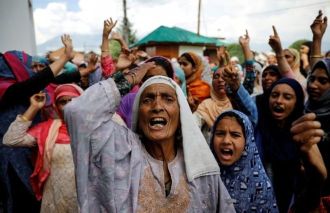
It becomes in short, India’s West Bank: a place for settlers to move in armed convoys and occupy another people’s land (and Google searches for “land rates” and “plots of land” in Kashmir spiked soon after its special status was revoked). Kashmiris will be turned into Palestinians—“aliens, stone pelters, terrorist, who need to be disciplned.”The Modi-Shah plan to “integrate” Kashmir looks perilously close to Jared Kushner’s plan for investment with independence in the West Bank!
Darkness at Noon: Kashmir and the Unraveling of Indian Democracy
August 8, 2019 at 2:33 pm | Posted in Uncategorized | Leave a commentTags: democracy, India, Kashmir, Pakistan, terrorism
Fresh from winning a huge mandate from the largest electoral exercise in history, the Narendra Modi government has just hammered the largest nail in the coffin of Indian democracy. Flooding the state of Jammu and Kashmir with over 35,000 additional troops, detaining its political leaders, severing landlines and internet and mobile phone connections, and imposing a state-wide curfew, the Indian Home Minister, Amit Shah, moved to end the state’s special constitutional status, and demoted its status from that of a state to the lesser-status of a union territory while bifurcating it as well. While the removal of Kashmir’s special constitutional status has dominated the headlines, it is the state’s demotion that is the more consequential.
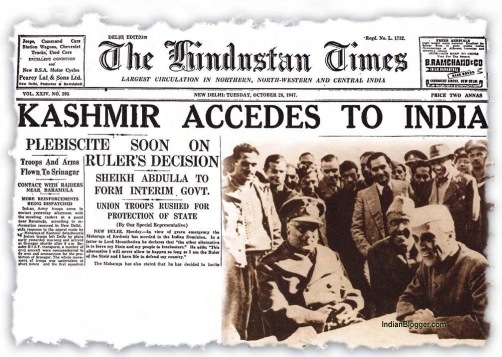
Article 370 of the Indian constitution had granted Jammu and Kashmir exemptions from the Indian Constitution and laws passed by the Indian Parliament except in the matters of defense, foreign affairs, and communications unless the state’s constituent assembly consented to these laws and constitutional provisions. Alone among the states of the country, Jammu and Kashmir had its own constitution and flag. This was the codification of the terms under which the state entered the Indian Union in October 1947 when it was faced with an invasion of tribesmen led by Pakistani officers. The Instrument of Accession, which has the status of a treaty between two sovereign states, had stipulated that provisions of the future constitution of India be applicable to the state only after these provisions had been accepted by the state’s own Constituent Assembly. In effect, this largely meant that the state had special autonomy not granted to other states especially that while the national Parliament “had exclusive powers to make laws pertaining to States, on all matters not in the State and Concurrent Lists, the residuary power rested with the State legislature in the case of J&K.” Such special status is not exceptional to India—Hong Kong and Macau, for instance, have a special status in China. In India too, other states like Nagaland also enjoy constitutional protection from the application of laws passed by Parliament in regards to their social and religious practices and to the administration of their civil and criminal jurisdiction as well as to the ownership of land by non-Nagas. This of course did not arouse the ire of the BJP as the Nagas were not Muslim!
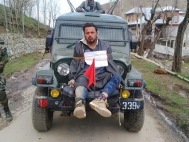
Indeed, over the years, Kashmir’s special status has steadily been eroded by Presidential Orders. In 1954, with the concurrence of its government and constituent assembly, most of the provisions of the Indian Constitution were extended to the state. At that time, a reactionary article limiting the ability to buy land to permanent residents of the state and mandating that the children of Kashmiri women marrying non-permanent residents lose their rights, was inserted into the Indian Constitution as Article 35A (the Kashmir High Court struck down the provision that women marrying outsiders lose their permanent residency rights in 2002). Subsequently, over 40 such Presidential Orders were issued further hollowing out the special status of the state. The Indian Government even arrogated to itself the power to change the state’s constitution—changing the position of the governor from one elected by its legislature to a nominee of the president—a power not granted to it by Article 370. Ironically, it is this very change that has allowed the Modi government to abolish the state’s special status: as the state legislature is dissolved it claimed that the governor—a nominee of the Modi government—represents the state government and that he has concurred with the extension of all the provisions of the Indian constitution and laws to the state, thus avoiding the need for a constitutional amendment!

Nevertheless, Kashmir’s special status has long been a bugbear for the rest of India and the fact that Kashmiris can freely buy land in most of the country (except parts of the Northeast where similar laws regarding land ownership by outsiders apply) has rankled middle classes in the rest of India. No matter that for 10 of the last 45 years, Kashmir has been under direct rule by New Delhi, no matter that elections in Kashmir were regularly rigged, that its independence leader, Sheikh Abdullah was broken by years of imprisonment, no matter that in practice the special status meant that it enjoyed such dubious
the abolition of its special status is widely popular in the rest of India.
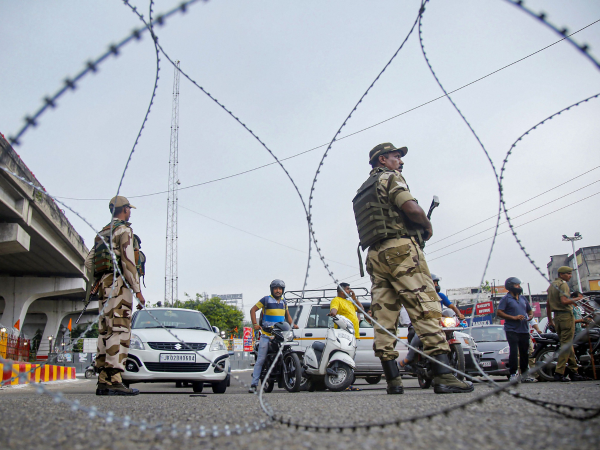
However, the stripping of Kashmir’s special status—hollowed out in practice though it may be—is an emotional issue for the people of the state. They woke up on August 6, 2019 in a place that was not only without its special status but was not even a state! As a union territory, the powers of the legislative body were substantially reduced: from having its elected head of state, Sadr-e-Riyasat, to a governor appointed by New Delhi, it now had only a Lt. Governor. Unlike states, union territories are administered directly by the Indian central government and even though the new union territory of Jammu and Kashmir has a legislature, its powers are significantly curtailed especially with regard to law and order and to land; the new union territory of Ladakh does not even have a legislature and would be directly administered by unelected bureaucrats.
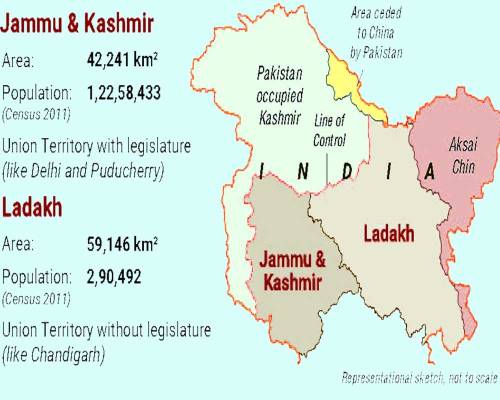
Never before in the history of India has a state been demoted to a union territory and this fundamentally calls into question the federal character of the Indian polity. It is this erosion of their democratic rights that led to the imposition of the type of
The arrest of political leaders who had been willing to cooperate with India, the shut down of the internet for the 53rd time this year, the imposition of curfew and the severance of all communication links within the state and between the state and the rest of India—even one-way forms of communications like cable TV—all point to the unpopularity of the moves in Kashmir. If democracy means anything, it means the consent of the governed, No matter how popular the Modi government’s elimination of Kashmir’s special status and its bifurcation into two union territories may be in the rest of India—except the Northeast where there are fears that they could be the next—it could only mean more disruption in Kashmir. Politicians who had been willing to cooperate with India can no longer do so as they would lose even the little credibility they had. It inevitably strengthens the hand of the hardlners. In these conditions if outsiders are allowed to buy land in Kashmir, security forces would have to protect them like the Israelis who settle in the West Bank.
Never before has India been as much an occupying power as now—and it is the right of the occupied to resist their subjugation!
Create a free website or blog at WordPress.com.
Entries and comments feeds.
